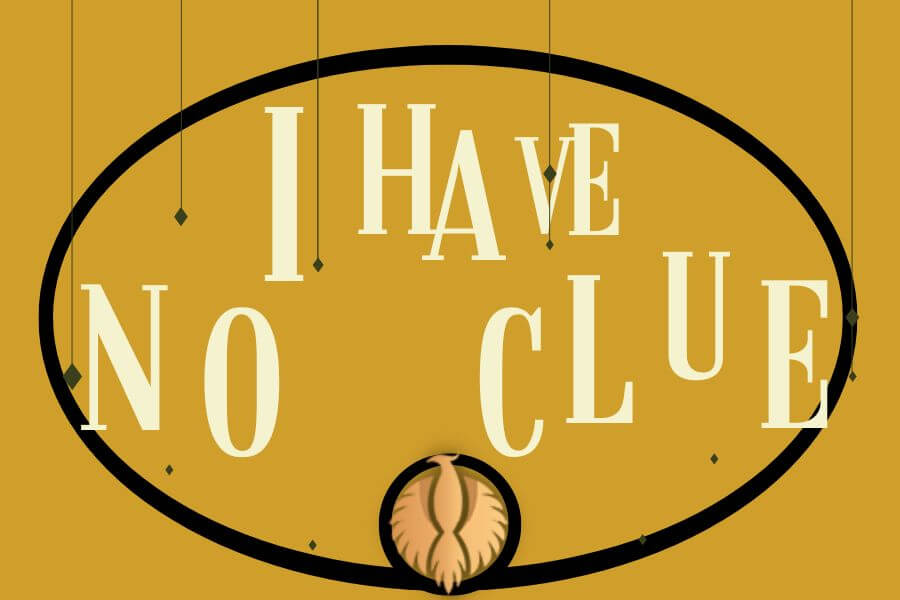Hi everyone! Today I am going to teach you a very interesting subject. When asked about something you have no idea about, what do you say in response?
I guess you usually say “I don’t know!”. Well, I’m asking you to stop saying this simple phrase and I’m going to teach you other phrases to express not knowing.
In the following, I have provided for you with alternative ways to express not knowing. One of these is the idiom “I don’t have a clue”.
Here is all you need to know about this idiom. We will talk about its meaning and synonyms. A few additional tips have been provided for you as well to help you learn this subject fully.
Don’t miss our new video about I Have No Clue – watch now!
What does “I have no clue” mean?
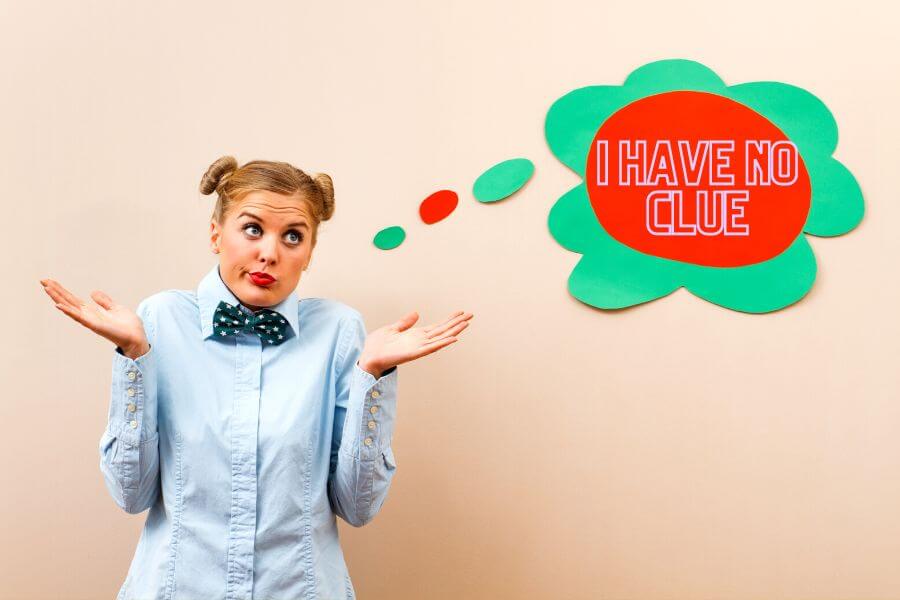
not have a clue/have no clue
Meaning: to be completely unable to guess, understand, or deal with something
Examples:
– “Who invented algebra?” “I don’t have a clue.”
– Don’t ask your father which key to press – he doesn’t have a clue about computers.
In order to understand the real meaning of the idiom, I want you to use your imagination.
Imagine you have just travelled to another city and you are walking in the street.
Someone who is looking for an address asks you “do you know where the city hall is?”.
In this situation, you have no idea where that place is, so you say “sorry, I have no clue”.
Therefore, “I have no clue” means:
“I have no idea”
“I don’t have the slightest idea”
or simply
“I don’t know”.
Notice: This is an informal way to express not knowing. So, never use it in formal occasions because it might sound impolite. In formal situations you can use “I’m afraid, I don’t know” or “I’m afraid I’m not sure”.
Other ways to say “I have no clue”
• “I haven’t a clue”
• “I don’t have a clue”
• “I’m clueless”.
Note: the word “clueless” can also mean “illiterate”.
You can also use the short forms “no clue” or “not a clue”. For example:
– Who is that man talking to the boss?
– No clue!
Important grammatical points
Note 1: When used in a sentence, you should use “on” or “about” after “I don’t have a clue”.
Examples:
– They clearly have no clue on how to fix the problem they’ve created.
– Why do you think I have a clue about Tom’s disappearance?
– When I met my wife, she didn’t have any clue about cricket.
– Congress, media, academia, and policy forums, still have no clue about what is
happening before their eyes.
Note 2: You can also use “that”, and all “wh words” after “I have no clue”.
Examples:
– I have no clue why he refused to act.
– I realized my players had no clue what I was talking about so I had to start anew.
– Police had no clue who did the rubbery.
– We have no clue what’s happening.
– I had no clue where to look for him.
– They have become completely out of touch with our society and have no clue
how to address the real issues in our society.
– Even his parents had no clue that he used to go back home drunk.
Note 3: you can use “as to” before “wh words” in these sentences.
Example:
– Currently, scientists have no clue as to how the cell could have originated
Without having been created by a designer
Note 4: you can use “have no clue” in “gerund form”.
Example:
– Having no clue where he was going, he stepped into the scene of a bank robbery.
Note 5: The adjective “without a clue” can also be used to express not knowing.
Following is a list of adjectives meaning “without a clue”:
Learn English for free and have fun with me!: As Busy as a One-Armed Paper Hanger + Examples
Synonyms for “without a clue”
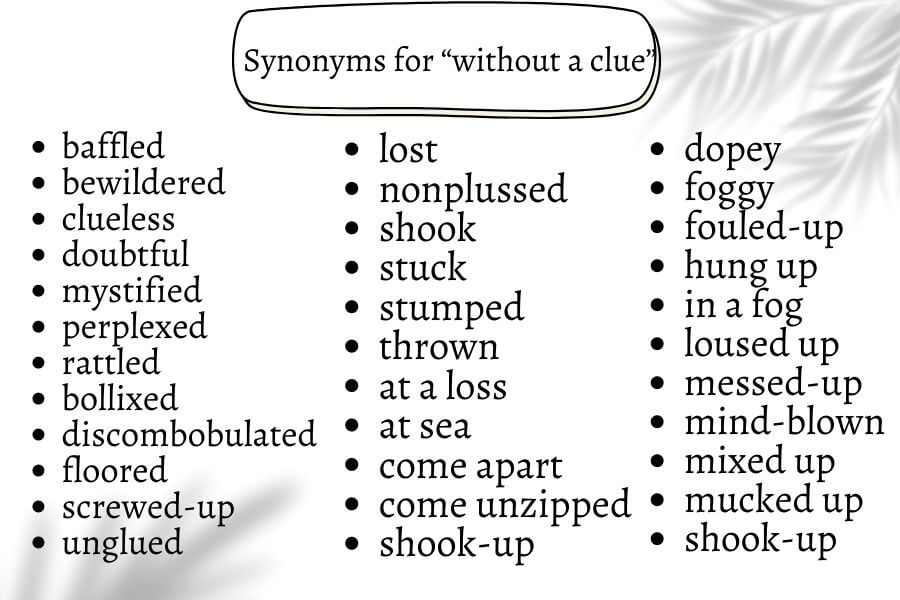
- baffled
- bewildered
- clueless
- doubtful
- mystified
- perplexed
- rattled
- bollixed
- discombobulated
- floored
- screwed-up
- unglued
- lost
- nonplussed
- shook
- stuck
- stumped
- thrown
- at a loss
- at sea
- come apart
- come unzipped
- shook-up
- dopey
- foggy
- fouled-up
- hung up
- in a fog
- loused up
- messed-up
- mind-blown
- mixed up
- mucked up
- shook-up
Learn English for free and have fun with me!: Ride the Tide [Definition + Examples]
Other idioms with the same meaning
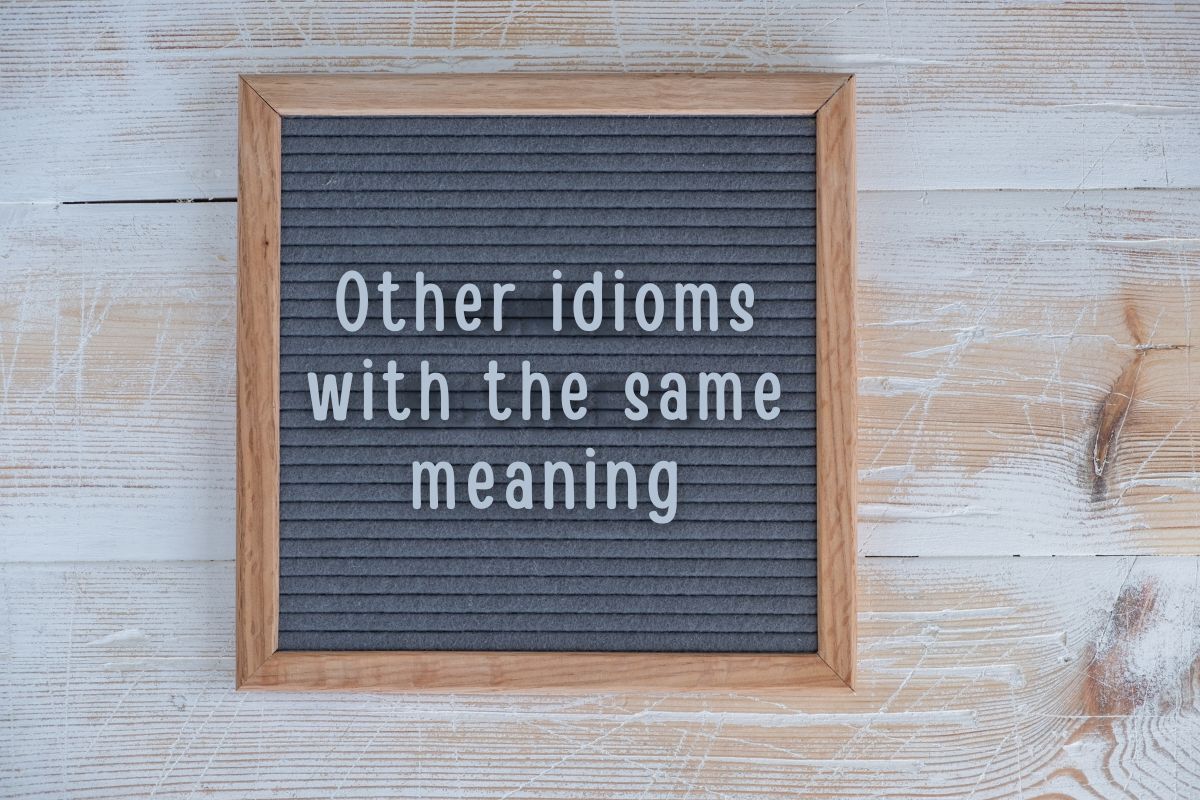
– be in the dark
Meaning: to not know about something that other people know about
Example: he was in the dark about what had happened.
– be on another planet
Meaning: to not give attention to what is happening around you and to think differently from other people
Example: Some days that girl seems as if she’s on another planet.
– Goodness/God/Heaven/Christ knows
Meaning: used to mean “I don’t know” or to emphasize a statement. Some people may find this use offensive:
Example 1: God only knows what’ll happen next!
Example 2: Take your shirt off – Heaven knows it’s hot enough today!
– in blissful ignorance
Meaning: not knowing any of the unpleasant facts about something
Example: All the time his business was failing, he kept his wife and family in blissful ignorance.
At the end, a few quotes including “have no clue” is provided for you to understand its usage in context better. The names of the authors are provided too.
20 points about using I Have No Clue
1. "I Have No Clue" can be a convenient and humorous way to express confusion or lack of knowledge
about a topic.
2. It can help break the tension in a conversation or lighten the mood when you're unsure of something.
3. Using "I Have No Clue" can also show humility and honesty in acknowledging when you don't know
something.
4. It can be used playfully among friends or colleagues to admit uncertainty.
5. "I Have No Clue" can be particularly useful in situations where it's better to admit you don't know
rather than pretend to have an answer.
6. It can be a refreshing change from trying to always have all the answers.
7. Using this phrase can encourage others to share what they know and contribute to the conversation.
8. It's a simple and straightforward way to communicate that you're unsure about something.
9. "I Have No Clue" can be a way to invite others to provide information or insights on a topic.
10. It can be a good way to avoid spreading misinformation by admitting your own uncertainty.
11. This phrase can be used casually in both informal and professional settings.
12. It can be a way to show vulnerability and openness in conversations.
13. "I Have No Clue" can be a humorous way to disarm a tense situation.
14. It can be used as a conversation starter by admitting what you don't know and inviting others to
share their knowledge.
15. This phrase can help foster a culture of honesty and transparency in communication.
16. It can be liberating to admit when you don't have all the answers.
17. "I Have No Clue" can be a way to connect with others over shared experiences of confusion or
uncertainty.
18. It can be used to show that it's okay not to know everything and that learning is a continuous
process.
19. This phrase can be empowering in its simplicity, allowing you to admit when you're unsure without
fear of judgment.
20. Overall, using "I Have No Clue" can be a lighthearted, honest, and effective way to navigate
conversations and interactions.
Quotes including “have no clue”
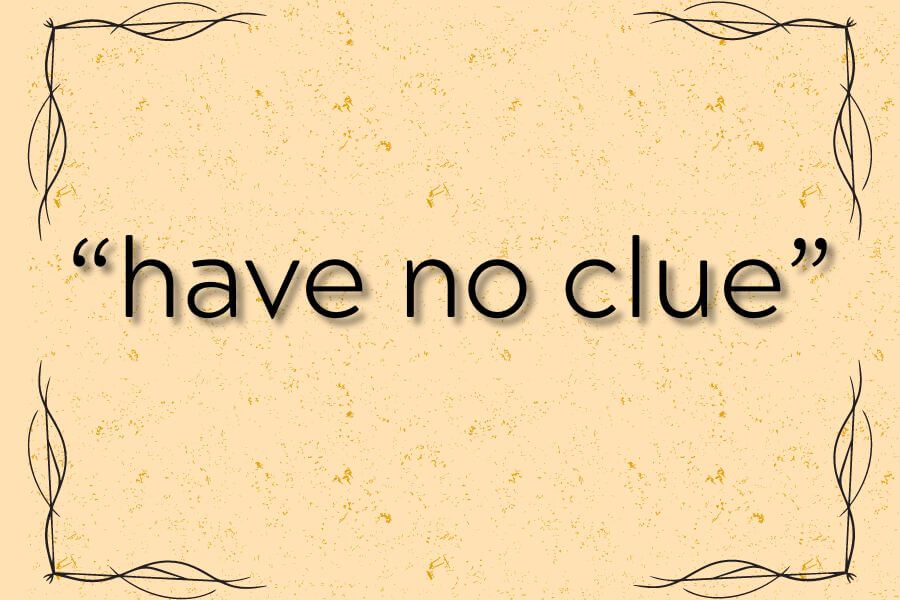
1.“There are a lot of bands who claim to be punk and they only play the music, they have no clue what it’s all about. It’s a lifestyle. It’s not about popularity and all that crap.”-Billie Joe Armstrong
2.“Keep people off-balance and in the dark by never revealing the purpose behind your actions. If they have no clue what you are up to, they cannot prepare a defense.”-Robert Greene
3.“One day, I can come up with 50 content ideas, and I’m like, ‘Boom, I want to do this idea, this idea, this idea.’ I have a YouTube notebook, and I write them all down. Then other days, I’m like, ‘I have no clue what I want to do today.’ I rarely have days like that.”-JoJo Siwa
4.“I have no clue why, but maybe sometimes when there’s someone you don’t hear from, it’s the person you want to hear from the most.”-Janet Jackson
5.“My theory is that if you look confident you can pull off anything – even if you have no clue what you’re doing.”-Jessica Alba
6.“If you don’t have that vision for the end goal, you have no clue where you’re going, and you’re going to work very hard to go nowhere.”-J. J. Watt
7.“None of us is responsible for the complexion of his skin. This fact of nature offers no clue to the character or quality of the person underneath.”-Marian Anderson
8.“Did you ever spell a word so bad that your spell check has absolutely no clue what you’re trying to spell? What do you end up getting, you end up getting, like, a question mark. You got a million dollars of technology just looking back at you like, ‘You got me, buddy. Which is pretty amazing because I have all the words.”-Bill Burr
9.“I had no clue on what I wanted to do when I was younger, so I was pretty lucky with this YouTube thing.”-KSI
10.“I have no clue how I got COVID. I am surprised.”-Randhir Kapoor
Learn English for free and have fun with me!: No Earlier Than – All You Need To Know [Meaning + Examples]
Concluding note
Ok dear learners. Today we learned lots of important and useful notes about “I have no clue”. We also reviewed other phrases to express not knowing.
Make sure you use these idioms and phrases in your conversations to sound more natural and native-like.
I hope all of you enjoyed this lesson. And visit my page for more interesting English lessons.
Frequently Asked Questions
- What does “I Have No Clue” mean?
“I Have No Clue” is a phrase used to express lack of knowledge or understanding about a particular topic or situation.
- Can you provide An example of when to use “I Have No Clue”?
Sure! If someone asks you a question about a complex scientific theory that you’re unfamiliar with, you can respond with “Sorry, I have no clue about that.”
- Is using “I Have No Clue” considered polite in conversations?
Yes, it’s generally considered polite to admit when you don’t know something rather than pretending to have an answer.
- Are there any situations where using “I Have No Clue” might not be appropriate?
While it’s usually acceptable in casual settings, in certain professional contexts, it may be more appropriate to say something like “I’m not sure, but I can look into it.”

Hi, welcome to my blog! My name is Omid and I am thrilled to have you here! I am an English language teacher with 12 years of experience and hold multiple international certifications (TESOL, IELTS, TOEFL, PTE, CELTA). Additionally, I hold a PhD in Applied Linguistics with a specialization in Teaching English as a Second Language (TESL), which fuels my passion for teaching English and assisting others in mastering the language. To me, nothing is more rewarding than helping individuals enhance their English language abilities through various methods. So, let’s embark on this journey of learning English together.

